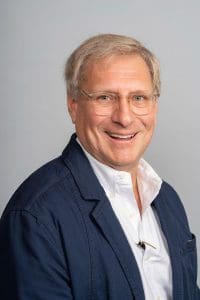 When you enroll in Syracuse University’s Doctor of Professional Studies in Information Management program, you get more than an education. The friendships and camaraderie among fellow students are an added bonus.
When you enroll in Syracuse University’s Doctor of Professional Studies in Information Management program, you get more than an education. The friendships and camaraderie among fellow students are an added bonus.
John Jordan, a professor of practice, is the program director for DPS and has witnessed the connection students have. One group of former DPS students are already planning a reunion. Others vacation together or babysit one another’s children.
“That degree of colleagueship and camaraderie really makes the program work,” he said.
Designed for mid-career professionals, the School of Information Studies’ DPS program attracts students who want to hone their skills and become leaders in their industries. Instead of spending up to six years earning a Ph.D., the DPS program is part time and allows students to earn a doctorate in three years while still working.
From IT professionals and data analysts to project managers and military veterans, they study alongside a diverse group of students, known as a cohort.
“The foundation really is the cohort,” said Jordan, who based DPS’ cohort model on the military concept of unit cohesion. “I try to build on the notion of diversity of backgrounds. My rule of thumb is I don’t want too many of any one type of person.”
That diversity of background and thought means the cohort can lean on each other, instead of only an advisor, to help them complete their theses. Some cohort members have expertise in data and coding while others excel in editing and presentation, for example.
“Nobody has the excuse of, ‘Well, these numbers are too hard for me,’ because somebody in the cohort will find that pretty simple,” Jordan said. “You lean laterally, more than on your advisor, for those skills. That leaning on each other is really gratifying to watch.”
DPS’ first cohort of students graduated this past May. The 10 students studied everything from teacher training in Ghana to the rise of do-it-yourself designers.
Meet some of DPS’ graduates:
- Army Officer Earns Doctorate, Studies Haitian Americans’ Financial Literacy
- Supply Chain Architect Found Flexibility in iSchool’s Doctorate Program
- Digital Divide Remains a Pressing Issue for Award-Winning iSchool Grad
A common question people ask when trying to decide whether to enroll in the DPS program is: Do I have to come with a fully formed research goal? The answer is no, says Jordan. Instead, come with a topic you’re passionate about and intense intellectual curiosity.
“It’s very rare that people come in with very well formed research questions. They’re coming in from professional careers, where you’re not doing research for a living,” he said. “We spend the first year working on what is doable that hasn’t been done yet, but that builds on what has been done. You have to care enough about it to be married to it for three years. If you don’t like your topic, you’re not going to do the work. It’s almost like a matchmaking process.”
While most students study topics closely related to their careers, some want to pivot and focus on a new area of expertise. After completing their thesis, students defend their work in front of their advisor, other iSchool faculty and the public. One student had 54 people watch her defense, mostly over Zoom.
“It’s not really an interrogation,” Jordan said. “If you were not ready to defend, you wouldn’t be there. You tell the world the great things you’ve done with this research.”
To learn more about DPS’ curriculum and example research topics, visit our program’s website and apply online.
